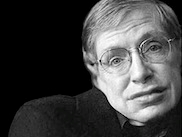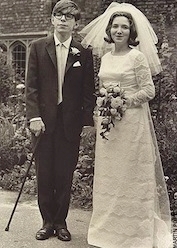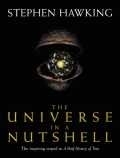 |
| (http://www.ted.com/speakers/stephen_hawking.html ()) |
A Man Without Limitations
"My goal is simple. It is a complete understanding of the universe, why it is as it is and why it exists at all."(Stephen Hawking) Completely understanding the universe is extremely difficult, yet people such as Stephen Hawking strive to unravel its mysteries. Stephen Hawking was born in Oxford, England on January 8, 1942. The date is exactly 300 years after the death of one of the most famous astronomers, physicists and mathematicians in history, Galileo Galilei. During his childhood, Stephen Hawking chose to study mathematics and physics. Despite the challenges he was facing at Cambridge, he continued to brighten his future in the field of science. Hawking has won numerous awards and wrote several books to keep his readers informed such as The Universe in a Nutshell. Because of his remarkable work, Stephen Hawking has become an inspiration for the disabled and able-bodied. Stephen Hawking has persevered through more challenges than most people will encounter in their lives.
 |
| (http://thisrecording.com/today/2009/4/21/in-which- ()) |
Unlike most children wanting to be a firefighter or a policeman, Hawking chose to "study mathematics and physics." Regardless of the challenges, '"Hawking decided very early in life what kind of work he planned to do: "From the age of twelve, I had wanted to be a scientist. And cosmology seemed the most fundamental science'"(Biography Reference Center). Hawking, unlike the majority of people, set the bar high. Upon entering Cambridge, Hawking was disappointed with who his professor was, and later on received news of a serious condition. As devoted as he was to science, Hawking didn't take care of his body well enough to keep up with the time spent studying. "Although he was coxswain on a university crew team, he was never robust or athletic, and he was becoming increasingly clumsy. At his parents' insistence, he saw a doctor"(Biography Reference Center). Everyone has passion and his was science, but sometimes too much one of one thing isn't healthy.
During the year of '65, Jane Wilde stepped into his life and his future enlightened as well as a university student. Soon his condition worsened. He started using a cane, then a wheelchair, and then followed the depression. Hawking has done more than succeed in the field of science. He went even further to watch others succeed. "He quickly became a professorial fellow and, by 1973, had joined the Department of Applied Mathematics and Theoretical Physics at Cambridge" Sharing his knowledge with others is what made him happy. Not too long after, Hawking was named Lucasian Professor of Mathematics at Cambridge in 1977. After encountering hardships, and gaining more experience through Cambridge. Hawking's future was bright in the field of theoretical science. As his school year continued, he was later diagnosed with Lou Gehrig's disease. He became more motivated to progress forward. "Hawking was told he would live perhaps another two years and entered a deep depression as he contemplated the futility of trying to complete his doctorate. Sciama his professor persuaded him to continue but refused to lower his standards"(Biography Reference Center) Hawking determined, and motivated he continued to work. Sciama didn't want him to stop. Dealing with hardships can blur your ability to make the right decision. Hawking's conditioned worsened, yet his work and passion for science strengthened.
 |
| (http://zed1.com/read.html ()) |
In 1968 Stephen Hawking received his Ph.D., and from there on his career began. His life quickly became wrapped around the universe of theoretical physics. "Hawking became the Lucasian Professor of Mathematics at Cambridge in 1979, a professorship once occupied by Newton, and he is a Fellow of Gonville and Caius College"(Cyclopedia Of World Authors). Even though Hawking is disabled, and not able-bodied like his colleagues he was still able to achieve more than them. Hawking's hypothesis and thesis's grabbed the attention of media but epically other theorists. After having an emergency tracheotomy, Hawking lost his voice and had a synthesizer built to talk for him. He was often asked how he felt. "'The answer is, not a lot. I try to lead as normal a life as possible, and not think about my condition, or regret the things it prevents me from doing, which are not that many"'(Great Lives from History). Unlike most people, Hawking wasn't self conscious about him and just accepted it. After his incident he continued to work and publish theories. There are people who criticize Hawking for building off Newton and Einstein's work. Even so, the glory belongs to him.
Hawking's once said that: "However bad life may seem, there is always something you can do, and succeed at. While there's life, there is hope." Through his words, Hawking's conveys his experience as a student and as a person who's faced challenges through life. He implies that no matter what gets in your way should be avoided, because you can be the only obstacle that gets in your way. Hawking's chose his future, and worked hard to achieve it. He also faced many bumps in the road that has dulled his spirit but with perseverance and dedication he has won several awards and nominations. Inspiration is: the process of being mentally stimulated to do or feel something creative. Stephen Hawking like Galileo Galilei, are remembered for being great scientists as well as people. Hawking, a great humanitarian inspires the disabled, the able-bodied, and I. A hero must be endowed with the mindset of perseverance, dedication to take on the effects of success and failure, and assist others to keep their head high in times of distress and uncertainty.
Works Consulted
Downey, Philip. "Stephen William Hawking." Science and Its Times. Ed. Neil Schlager and Josh Lauer. Vol. 7: 1950 to Present. Detroit: Gale, 2001. 446-447. Gale Virtual Reference Library. Web. 17 Dec. 2012.
Magrass, Yale R., and Magrass Yale R. "Stephen Hawking." Great Lives From History: The Twentieth Century (2008): 1. Biography Reference Center. Web. 10 Dec. 2012.
Murphy, B. Keith, and Murphy B. Keith. "Stephen Hawking." Cyclopedia Of World Authors, Fourth Revised Edition (2003): 1. Biography Reference Center. Web. 12 Dec. 2012.
Remarks at the White House Millennium Lecture With Stephen Hawking, March 6, 1998. N.p., 2001. Web.
"Stephen W. Hawking." Stephen W. Hawking (Biography Today) (2010): 1. Biography Reference Center. Web. 12 Dec. 2012.
Witherbee, Amy. "Stephen Hawking." Stephen Hawking (Great Neck Publishing) (2006): 1. Science Reference
Center. Web. 11 Dec. 2012.
Page created on 1/10/2013 12:00:00 AM
Last edited 4/18/2024 5:52:50 AM
